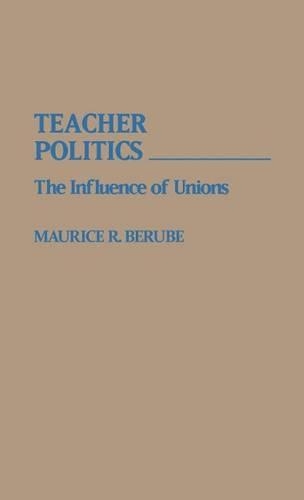
Teacher Politics: The Influence of Unions
(Hardback)
Publishing Details
Teacher Politics: The Influence of Unions
By (Author) Maurice R. Berube
Bloomsbury Publishing PLC
Praeger Publishers Inc
16th May 1988
United States
Classifications
Tertiary Education
Non Fiction
331.8811371100973
Physical Properties
Hardback
185
Description
In a landmark contribution to the education literature, Berube examines the political activities of the two teachers' unions--the National Education Association (NEA) and the American Federation of Teachers AFL-CIO (AFT) during the last three decades. The first scholarly study of its kind, Teacher Politics argues that teachers' unions have become the most powerful political constituency in the nation. Through effective lobbying arms seeking favored legislation and political machines supporting local, state, and national candidates with manpower and money, this force of 2.5 million teachers is changing American educational politics. As Berube convincingly demonstrates, teacher unions have been reasonably effective in their political and legislative endeavors and, through their enormous resources, have become the chief representatives of education in American politics.
Reviews
Berube has written an interesting comparison/contrast of the National Education Association and the American Federation of Teachers from the 1960s to the present. The chapters explore unions as political action committees. Berube emphasizes them as the" . . . most powerful political constituency in education . . . they have become the chief representatives of education in American politics." Other chapters cover a brief history of the unions and their positions on several current issues, including the school reform movement. The final chapter urges the unions to consider merging to better fulfill their role as the advocate for education. The author's balanced presentation of the unions' philosophy begins with the bread-and-butter issues and progresses to teachers becoming professionals. Berube uses case studies relating to how the unions can affect, on national and local levels, the election of individuals. . . the book will be of value to first-year graduate students. . .-Choice
Teacher Politics: The Influence of Unions posits that teacher unions have become the most powerful political constituency in education.' That may not seem like a startling position, but as the author documents, the rise of teacher politics has indeed been, in the words of the journal, Phi Delta Kappan, the most astonishing story of our time.' In a climate of shifting alliances between parents, students, legislatures, and the federal government, teacher unions have become the chief representatives of education in American education. The author describes in economical, almost journalistic prose, the rise of teacher politics and the agendas of the NEA and AFT, which as he points out, have almost reversed themselves politically over the years. Be warned that the book is no unqualified paean to teacher unions, either: the author squarely confronts two problems; first, that the unions have been reactive to school reform (witness how the reforms of the 80s seem to catch organizations napping, and their responses were characteristically dilatory); second, the very fact that there are two major unions competing for members and influence has done education not much more good than the proliferation of Popes during the Great Schism. What the author sensibly suggests is that the two merge. As an overview of where we've been and where we should consider going Teacher Politics is an engaging summary of shop-talk issues for teachers.-CURRICULUM REVIEW
"Berube has written an interesting comparison/contrast of the National Education Association and the American Federation of Teachers from the 1960s to the present. The chapters explore unions as political action committees. Berube emphasizes them as the" . . . most powerful political constituency in education . . . they have become the chief representatives of education in American politics." Other chapters cover a brief history of the unions and their positions on several current issues, including the school reform movement. The final chapter urges the unions to consider merging to better fulfill their role as the advocate for education. The author's balanced presentation of the unions' philosophy begins with the bread-and-butter issues and progresses to teachers becoming professionals. Berube uses case studies relating to how the unions can affect, on national and local levels, the election of individuals. . . the book will be of value to first-year graduate students. . ."-Choice
"Teacher Politics: The Influence of Unions posits that teacher unions have become the most powerful political constituency in education.' That may not seem like a startling position, but as the author documents, the rise of teacher politics has indeed been, in the words of the journal, Phi Delta Kappan, the most astonishing story of our time.' In a climate of shifting alliances between parents, students, legislatures, and the federal government, teacher unions have become the chief representatives of education in American education. The author describes in economical, almost journalistic prose, the rise of teacher politics and the agendas of the NEA and AFT, which as he points out, have almost reversed themselves politically over the years. Be warned that the book is no unqualified paean to teacher unions, either: the author squarely confronts two problems; first, that the unions have been reactive to school reform (witness how the reforms of the 80s seem to catch organizations napping, and their responses were characteristically dilatory); second, the very fact that there are two major unions competing for members and influence has done education not much more good than the proliferation of Popes during the Great Schism. What the author sensibly suggests is that the two merge. As an overview of where we've been and where we should consider going Teacher Politics is an engaging summary of shop-talk issues for teachers."-CURRICULUM REVIEW
Author Bio
MAURICE R. BERUBE is Associate Professor of Urban Education at Old Dominion University.
